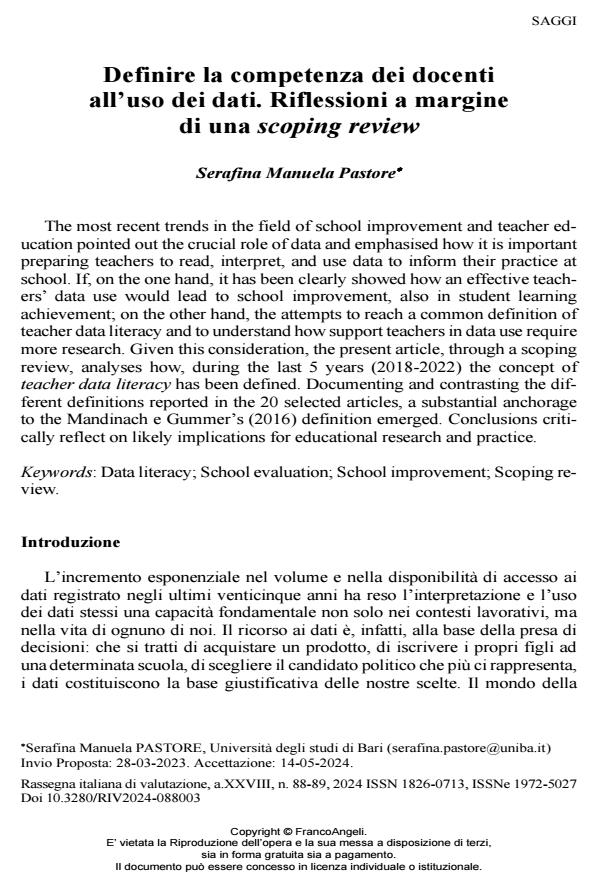Definire la competenza dei docenti all’uso dei dati. Riflessioni a margine di una scoping review
Titolo Rivista RIV Rassegna Italiana di Valutazione
Autori/Curatori Serafina Manuela Pastore
Anno di pubblicazione 2024 Fascicolo 2024/88-89
Lingua Italiano Numero pagine 22 P. 33-54 Dimensione file 566 KB
DOI 10.3280/RIV2024-088003
Il DOI è il codice a barre della proprietà intellettuale: per saperne di più
clicca qui
Qui sotto puoi vedere in anteprima la prima pagina di questo articolo.
Se questo articolo ti interessa, lo puoi acquistare (e scaricare in formato pdf) seguendo le facili indicazioni per acquistare il download credit. Acquista Download Credits per scaricare questo Articolo in formato PDF

FrancoAngeli è membro della Publishers International Linking Association, Inc (PILA), associazione indipendente e non profit per facilitare (attraverso i servizi tecnologici implementati da CrossRef.org) l’accesso degli studiosi ai contenuti digitali nelle pubblicazioni professionali e scientifiche.
The most recent trends in the field of school improvement and teacher education pointed out the crucial role of data and emphasised how it is important preparing teachers to read, interpret, and use data to inform their practice at school. If, on the one hand, it has been clearly showed how an effective teachers’ data use would lead to school im-provement, also in student learning achievement; on the other hand, the attempts to reach a common definition of teacher data literacy and to understand how support teachers in data use require more research. Given this consideration, the present article, through a scoping review, analyses how, during the last 5 years (2018-2022) the concept of teacher data literacy has been defined. Documenting and contrasting the different definitions reported in the 20 selected articles, a substan-tial anchorage to the Mandinach e Gummer’s (2016) definition emerged. Conclusions critically reflect on likely implications for edu-cational research and practice.
Parole chiave:Data literacy; School evaluation; School improvement; Scoping review.
- Promuovere l'autovalutazione: dal setting formativo all'aula scolastica katia Montalbetti, in EXCELLENCE AND INNOVATION IN LEARNING AND TEACHING 1/2025 pp.45
DOI: 10.3280/exioa1-2025oa20581
Serafina Manuela Pastore, Definire la competenza dei docenti all’uso dei dati. Riflessioni a margine di una scoping review in "RIV Rassegna Italiana di Valutazione" 88-89/2024, pp 33-54, DOI: 10.3280/RIV2024-088003